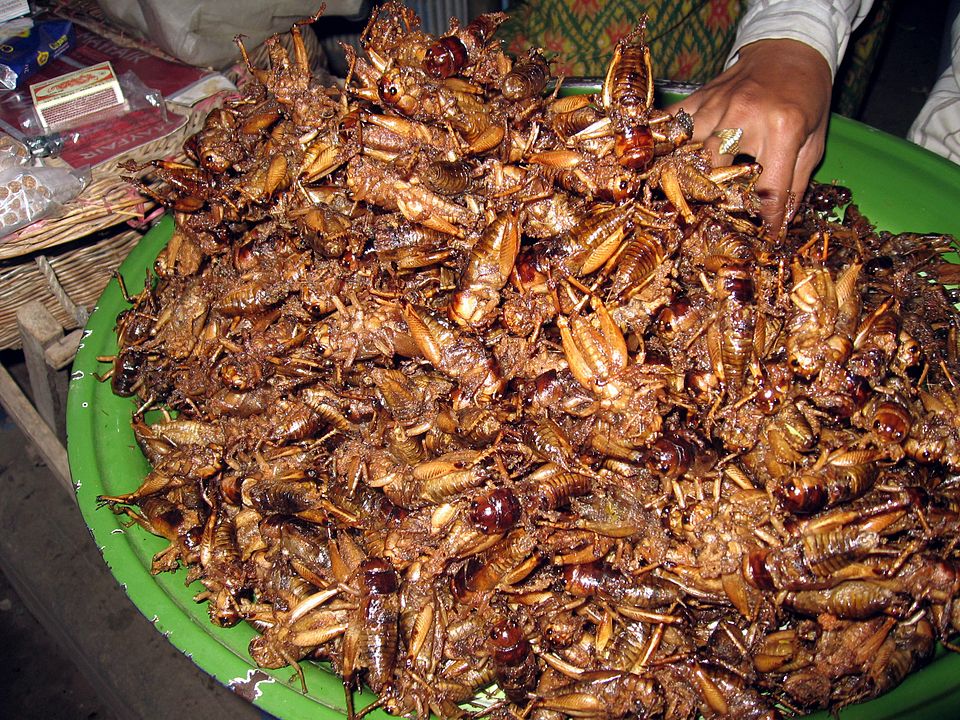
Locusts & Honey. Mmm…

It’s easy to get sidetracked by the odd details about John the Baptist: He wore that stylish camel’s hair jacket with a nice leather belt. And he ate a high protein diet featuring insects — and like the kid’s poem about keeping peas on one’s knife, John improved their taste with a touch of honey.
John comes up because on the Second Sunday of Advent we take a giant step backward in our waiting for Jesus.
Remember that on Advent 1 the lectionary placed us in the present, waiting for the return of Jesus at the end of the age. This week we jump back to waiting for his earthly ministry. We are with John the Baptist on the banks of the Jordan, awaiting Jesus’ baptism.
Matthew 3:1-12
Jesus doesn’t appear in Matthew 3:1-12. It’s Advent, after all. We’re waiting.
The focus is on John the Baptist’s ministry — but John had an Advent sort of ministry. That is, John’s own focus was on preparing the people for the coming of his cousin.
More importantly, however, we need to pay attention to his message.
The Way of Repentance
John preached a call to action:
Repent,
for the kingdom of heaven has come near.” (Matthew 3:2 NRSV)
The word points to inner change: the literal meaning of the word translated “repent” is to change your mind. You might say John called the people to find a new way of thinking.
But that inner change is more than shifting your opinions. It is about core change in our being, leading to change of who we are in the world. You get a sense of that in Matthew’s explanation that John was fulfilling a prediction of the prophet Isaiah. He says John was
The voice of one crying out in the wilderness:
‘Prepare the way of the Lord,
make his paths straight.’” (Matthew 3:3 NRSV)
There’s a metaphor of major construction in those words. Out in the untamed wilderness of our lives we are to make a path, a road, for the Lord to travel on. We need to make it a straight shot so he can reach his destination quickly and easily.
So the call in John the Baptist’s Advent message is to do what we need to do to make sure Jesus can reach us. Don’t leave him wandering out there in the wasteland. Get organized. Build a road.
And the people listened to John’s message. They tried to do just what he said by coming out to meet him. They admitted that they had done bad things, and got symbolically washed of their accrued filth in the Jordan.
The Call to Bear Fruit
Take note, however, that John clearly wanted more than symbolic action. There is that implicit major construction project in Matthew’s quotation from Isaiah. But there is also evidence from John’s own mouth.
The people came out in great numbers. John saw the very religious (and I’d argue that in significant ways that means the very faithful) among them. Maybe that was all who came — only the Pharisees and Saducees are named. John greeted them with insults:
You brood of vipers!
Who warned you to flee
from the wrath to come?” (Matthew 3:7 NRSV)
That should have gotten their attention. (Or more likely, it raised the hackles of their anger. I don’t think the ancients would grade John well for rhetorical strategy.)
Then comes the call to more than symbolic action:
Bear fruit worthy of repentance.” (Matthew 3:8 NRSV)
He pointed to specific problematic attitudes they needed to retool, like thinking they were okay because of their genetic connection to the founders of the faith. And he gave them some harsh, apocalyptic warnings about the Lord’s axe being ready to cut them down like trees, and the Lord’s winnowing fork being ready to sort their wheat from their chaff.
But the main thing is the beginning of the agricultural metaphor:
Bear fruit worthy of repentance.” (Matthew 3:8 NRSV)
They aren’t just to build a straight road for Jesus through their hearts’ wilderness. If they profess repentance and receive baptism, they need to be like healthy fruit trees — they have to produce something useful; something tasty.
So repentance is indeed a change of mind, but it needs to work its way outward in a change of behavior — a life the is fit for God’s kingdom. After all, that’s the core of his preaching:
Repent,
for the kingdom of heaven has come near.” (Matthew 3:2 NRSV)
The One for Whom We Prepare
But neither John’s riverbank congregation nor we today should think the whole thing is just about us changing our own behavior.
Both the inner change of repentance and the outward change of fruitful life are about receiving the One who was then alive in Judea and about to come for baptism and begin his public ministry.
I baptize you with water for repentance,
but one who is more powerful than I is coming after me;
I am not worthy to carry his sandals.
He will baptize you with the Holy Spirit and fire.” (Matthew 3:11 NRSV)
It is easy to stop short of the point of Advent when we look at this text. We think it is all about repentance (which is surely a good thing), or that it is all about baptism (which is an excellent thing as well).
Don’t fail to note that all the repenting and all the baptizing are about making ready for Jesus.
We need Jesus who brings us the Holy Spirit to make us newer than our own repentance ever could.
We need Jesus who brings the refiner’s fire to really remove the impurities and make us finally shine like gold, reflecting his true image.
And that’s what Advent is all about.
++++++++++++
I’d love to send you my Monday Meditations, as well as my other new articles and announcements. Scroll down to the black box with the orange button to subscribe, and they’ll arrive most Fridays by email.

Leave a Reply